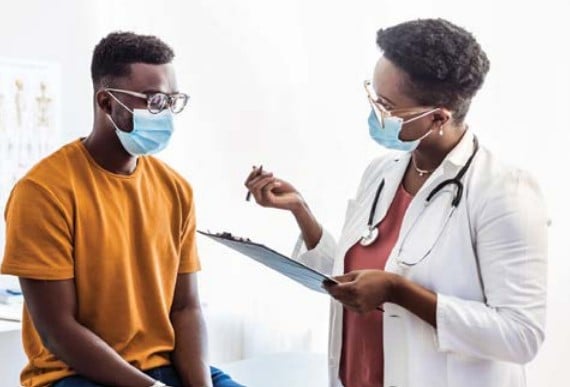Preventive care
To help you stay healthy, WellSense covers preventive care services for children and adults. Many screenings, immunizations and well visits are covered under your plan, depending on your age and risk factors. Consult your plan documents for more information.

Screenings
- Alcohol misuse
- Blood pressure and preeclampsia
- Bone density
- Breast cancer
- Cervical cancer
- Chlamydia
- Cholesterol
- Colorectal cancer
- Depression, including maternal
- Diabetes, including gestational
- Domestic and interpersonal violence
- Gonorrhea
- Hepatitis
- HIV
- Lung cancer
- Obesity
- Pelvic exams and pap smears
- Rh(D) incompatibility
- Syphilis
- Tobacco use
- Tuberculosis
Immunizations
- Chickenpox (Varicella)
- COVID-19
- Diphtheria
- Flu (influenza)
- Hepatitis A
- Hepatitis B
- Human Papillomavirus (HPV)
- Inactivated poliovirus
- Measles
- Meningococcal
- Mumps
- Pneumococcal
- Respiratory syncytial virus (RSV)
- Rotavirus (RV)
- Rubella
- Shingles
- Tetanus
- Varicella
- Whooping Cough (Pertussis)
Find out which vaccines are recommended by CDC for you and your family members based on your ages:
Well visits
- Adults:
- See your primary care provider (PCP) for a well visit/annual physical once per year
- Children:
- Prenatal and postpartum:
- If you find out you're pregnant, it's important to begin your prenatal well visits right away. Learn more about pregnancy and postpartum health.
Debunking HPV vaccine myths: what you need to know
The HPV vaccine is very helpful in preventing cancers such as cervical, throat and anal. We understand that there are many myths about the harm the HPV vaccine may cause, which might make you hesitant to get it. Learn more about the safe and effective HPV vaccine.
- Get regular eye exams to detect problems early. All WellSense plans offer routine eye exams.
- If prescribed glasses, wear them frequently. Some WellSense plans offer discounts on eyeglasses.
- Wear sunglasses with UV protection.
- Eat a balanced diet rich in nutrients like omega-3 fatty acids, lutein, zinc, and vitamins C and E.
- Reduce screen time and take regular breaks while using computers or smartphones. Consider using blue-light blocking glasses for extended screen use.
- Use proper lighting when reading or working.
- Protect your eyes from injury by wearing protective eyewear during sports or hazardous activities.
- For dry eyes, use artificial tear drops or try adding moisture to the air with a humidifier.
- Avoid smoking, which can increase the risk of age-related eye diseases. If you need help to stop smoking, Massachusetts WellSense members can ask their doctor to refer them to QuitWorks and New Hampshire WellSense members can call QuitNow NH at 800-QUIT-NOW.
- Blurry/hazy vision
- The need to squint to see clearly
- Headaches caused by eyestrain
- Difficulty focusing on objects
- Eye irritation or pain
- Sensitivity to light or glare
- Peripheral (side) vision loss
- Tunnel vision
- Difficulty adapting to low light
Take your medicines as prescribed
- Know exactly how and when to take your medications.
- Take your meds on time. Use notes or a smartphone app.
- Have your medication with a small meal or snack to avoid side effects.
- You may need to take the medications for a long time.
- Talk to your doctor before stopping medications.
Fill your medications on time
- Set up automatic refills or refill reminders at your pharmacy,
- Consider using our mail order pharmacy to get a three month supply of medications mailed to your home. Contact Cornerstone Health Solutions at 844-319-7588 to get started.
Monitor your blood sugar levels
- Blood sugar testing shows how well your medications are working or how your food intake, exercise or illnesses are affecting your blood sugar levels.
- Check blood sugar levels using a blood glucose meter. Follow your doctor’s advice on how often you need to check your blood sugar level. Keep a record of your levels to discuss with them.
- If you take insulin, check your blood sugar before meals and snacks as well as before and after exercise.
Know your target blood sugar range
The American Diabetes Association recommends the following target blood sugar levels:
- Before meals: 80-130mg/dl
- Two hours after meals: Less than 180mg/dl
WellSense vision benefits
All WellSense plans provide routine, preventive vision exams. Some offer eyeglasses (lenses and/or frames), contact lenses, and additional vision services. See your plan documents below for more details.
| Plan | Preventive | Lenses/Frames/Contacts | Vision services |
| Clarity |
|
|
|
| MassHealth |
|
|
|
| Senior Care Options |
|
|
|
| New Hampshire Medicaid |
|
|
|
| New Hampshire Medicare Advantage |
|
|
|
WellSense plan benefits
Find your specific plan's benefits using the links below.
Find an eye doctor
Our network includes experienced eye doctors who provide personalized care. Use our provider locator to find an eye doctor, ophthalmologist or optometrist in your plan’s optical network.
You are leaving the WellSense website
You are now leaving the WellSense website, and are being connected to a third party web site. Please note that WellSense is not responsible for the information, content or product(s) found on third party web sites.
By accessing the noted link you will be leaving our website and entering a website hosted by another party. Please be advised that you will no longer be subject to, or under the protection of, our privacy and security policies. We encourage you to read and evaluate the privacy and security policies of the site you are entering, which may be different than ours.